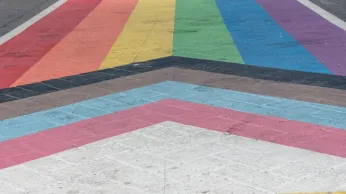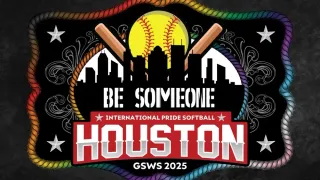
8 hours ago
Hundreds Rally in Miami Beach’s “Forever Proud March” to Protest Florida Crackdown on Rainbow Crosswalks
READ TIME: 4 MIN.
Hundreds of community members, LGBTQ+ advocates, and allies marched through the heart of Miami Beach on Sunday, carrying rainbow flags and signs in a bold response to Florida’s recent crackdown on symbols of LGBTQ+ pride in public spaces. The demonstration, known as the “Forever Proud March,” was organized by Miami Beach Commissioner Alex Fernandez in partnership with the Greater Miami LGBT Chamber of Commerce, drawing attention to what organizers describe as a coordinated effort to erase LGBTQ+ visibility from the city’s streets and parks .
The march began at the LGBT Visitor Center on Washington Avenue, where participants gathered to collect free Pride and Progress flags and handmade signs. Chanting slogans such as “This is what democracy looks like” and “Pride rights are human rights,” the crowd advanced through the city’s iconic Art Deco district, demanding an end to what they see as a discriminatory campaign against LGBTQ+ representation .
Miami Beach Commissioner Alex Fernandez, the city’s only openly gay elected leader, addressed the crowd, declaring, “We will not allow safety to be used as a cover for censorship or for erasing a symbol that represents love, visibility, and equality.” Fernandez emphasized that the rainbow crosswalks are more than just street art—they are essential markers of inclusion and safety for the LGBTQ+ community and beyond .
Miami-Dade County Mayor Daniella Levine Cava also joined the march, publicly criticizing the state’s directive as arbitrary and “about erasing people’s identity.” She pointed out that rainbow crosswalks not only celebrate diversity but also make intersections safer for pedestrians—a claim at direct odds with the state’s argument that such art distracts drivers and poses safety risks .
The demonstration was sparked by a recent order from the Florida Department of Transportation (FDOT) requiring cities to remove street art “associated with social, political, or ideological messages.” The state warned that municipalities failing to comply could face the loss of millions in funding, placing pressure on Miami Beach, Fort Lauderdale, Key West, and other cities with prominent LGBTQ+ crosswalks and murals .
Governor Ron DeSantis defended the measure, insisting that crosswalks and roadways should be reserved for their “intended purposes.” State transportation officials echoed this, claiming—without providing evidence—that the colorful designs could confuse or distract drivers. However, local leaders and LGBTQ+ advocates argue that these justifications are a pretext for rolling back hard-won visibility and inclusion, warning that the order could open the door to further restrictions on LGBTQ+ expression in public life .
Cities across Florida have begun to resist the state’s demands. In Fort Lauderdale, dozens held a similar protest on Saturday, lining the beach with signs reading “We will not be erased.” City commissioners in Fort Lauderdale voted to appeal the FDOT order, joining Key West and Delray Beach in their opposition .
The “Forever Proud March” is part of a growing wave of resistance against policies seen as targeting LGBTQ+ Floridians. Equality Florida, a leading advocacy group, recently launched the #ShowYourRainbow campaign, urging supporters to display rainbow flags and chalk colorful art in private spaces as a form of peaceful protest. Organizers emphasized that the campaign is not just about crosswalks but about defending the ability of cities and communities to celebrate diversity openly and safely .
For many, the march was a chance to reclaim public space in the face of what they see as rising hostility. Alfredo Olvera, president of the Dolphin Democrats, warned that the crosswalk ban represents a broader threat: “If we don’t push back now, we risk seeing LGBTQ+ visibility rolled back not just in the streets, but everywhere in our daily lives” .
First installed in 2018, Miami Beach’s rainbow crosswalks on Ocean Drive have become a symbol of the city’s commitment to celebrating LGBTQ+ identities year-round. The brightly colored intersections serve as a visible sign of acceptance and have become popular photo spots for visitors, residents, and Pride organizers alike. For many marchers, their removal would signal not just the loss of public art, but the erasure of a vital piece of Miami Beach’s identity .
As the protest wound down, participants were clear that the fight is far from over. Organizers vowed to continue challenging the order in court and at the ballot box, with calls for allies across Florida and the nation to join in solidarity. “Our visibility is not up for negotiation,” said one marcher. “These colors belong here—because we belong here.”
The struggle over rainbow crosswalks in Miami Beach underscores a larger debate about the role of LGBTQ+ symbols in public life at a time when such displays face increasing scrutiny and opposition in various parts of the United States. As cities like Miami Beach, Fort Lauderdale, and Key West continue to fight for their right to celebrate diversity, advocates say the outcome will set a precedent for the future of LGBTQ+ visibility and inclusion nationwide .
For the hundreds who rallied on Sunday, the message was clear: Miami Beach remains “Forever Proud”—and the fight for visibility continues.






